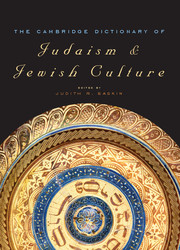Book contents
N
Published online by Cambridge University Press: 05 August 2014
Summary
Nagid is a title of biblical origin (I Sam 10:1) that was used to refer to Jewish notables and communal leaders in the lands of *Islam. Initially this title was an honorific bestowed by the *geonic academies (yeshivot) of *Babylonia and *Palestine; by the Mamluk period in *Egypt (1250–1517), nagid was the official designation of the head of the Jewish community, a position that had become hereditary. Documents from the Cairo *Genizah indicate that the use of nagid in this sense already appeared around 1065, when the office of head of the community was first established, but it did not become the normative title until the thirteenth century.
Before the thirteenth century, local Jewish notables who were close to Muslim authorities, many of whom were physicians (see MEDICINE) and had unimpeded access, would be granted the title nagid by one or more of the geonic academies. This title was in recognition of both their intermediary roles on behalf of the Jewish community and their support of the academies. Thus, the title, the equivalent of the Arabic amīr, recognized the authority of these notables rather than conferring it on them, and its use by the notables constituted deference to geonic leadership.
Jewish communal leaders in Tunisia (see NORTH AFRICA), *Spain, and *Egypt bore this title from the eleventh century, perhaps the most famous being the Granada physician and courtier Samuel ibn Naghrela (d. ca.1056), also known as *Samuel ha-Nagid; the title also appears periodically in the twelfth century in *Syria and *Yemen.
- Type
- Chapter
- Information
- The Cambridge Dictionary of Judaism and Jewish Culture , pp. 453 - 462Publisher: Cambridge University PressPrint publication year: 2011



